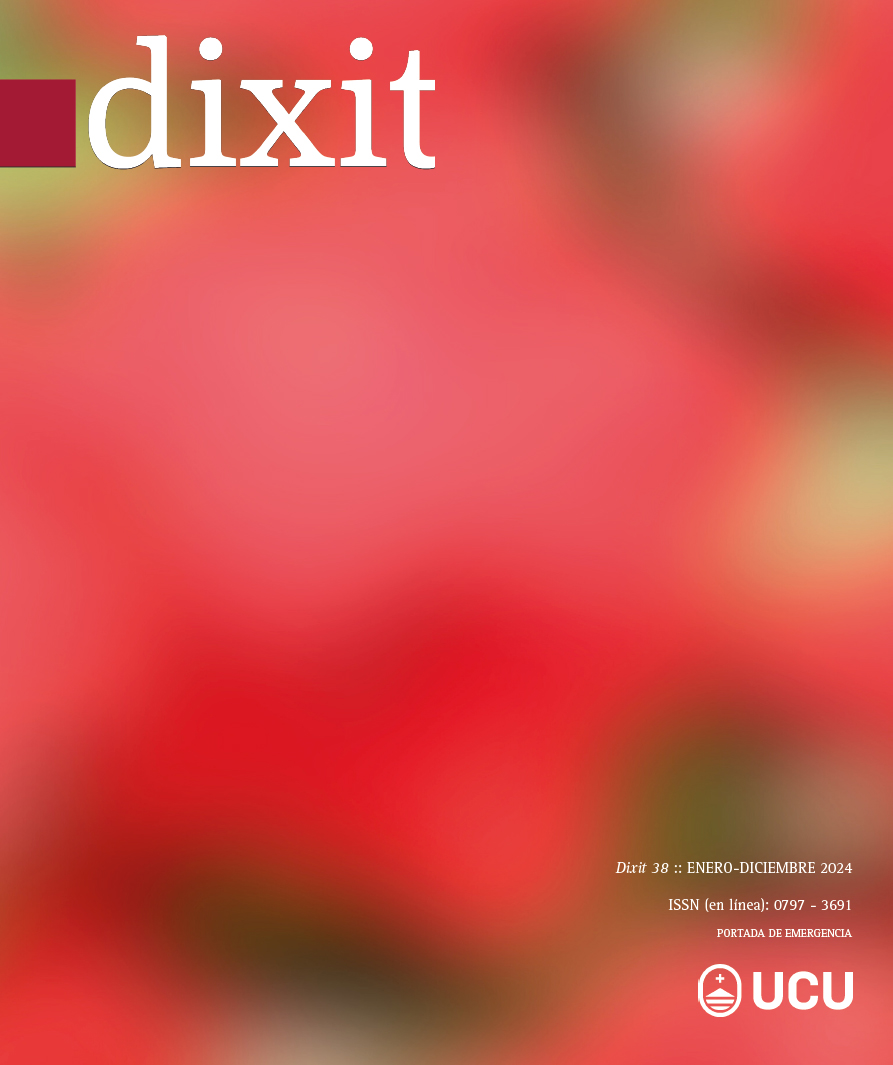Strategic Sentiments: The European Commission’s Social Media Response to the Russia-Ukraine Crisis
DOI:
https://doi.org/10.22235/d.v38.3644Keywords:
crisis communication, digital strategy, European Commission, sentiment analysis, geopolitical eventsAbstract
The use of online platforms by the European Commission, particularly during the Russia-Ukraine crisis in the context of the digital age, offers informative insights about current crisis communication. Between February 1 and October 26, 2022, this study analysed the Commission’s activities on the primary platforms, Facebook and Twitter. To carry out this analysis, the study used RStudio and the SentimentAnalysis package within R. The Blake & Mouton’s Grid was additionally employed as a reference point to extract the strategic dimensions. The data revealed distinct usage patterns by the Commission: Twitter acted as a channel for quick and immediate updates, making use of its real-time communication capabilities, while Facebook was used for more detailed conversations with a wider audience. Regarding sentiment, most of the Commission’s communications had a neutral or positive tone. Nevertheless, there were cases where certain critical issues prompted the Commission to take definite positions, providing insight into their strategic intent and priorities. To summarise, the European Commission’s online communication during the relevant period showed an informed and platform-specific methodology. Through comprehending and improving the platforms' functionalities and audience preferences, the Commission established a communication structure that can be utilised as a model for entities that intend to simplify their digital interaction procedures, particularly in the event of a crisis.
Downloads
References
Barton, L. (1993). Crisis in organizations: Managing and communicating in the heat of chaos. South-Western Pub.
Blake, R. R., & Mouton, J. S. (1970). The Fifth Achievement. The Journal of Applied Behavioral Science, 6(4), 413-426. https://doi.org/10.1177/002188637000600403
Coombs, W. T. (2021). Ongoing crisis communication: Planning, managing, and responding. Sage.
European Commission [@EU_Commission]. (2022, March 18). Denying Russia’s most-favoured-nation status means that the country may be subject to higher tariffs and import bans [Image attached] [Post]. X. https://x.com/vonderleyen/status/1496095277811388416
Fadel Arandas, M., & Yoke Ling, L. (2021). The Russian Crisis Communication Response Beyond Mh17 Tragedy. In C. S. Mustaffa, M. K. Ahmad, N. Yusof, M. B. M. H. Othman, & N. Tugiman (Eds.), Breaking the Barriers, Inspiring Tomorrow, vol 110. European Proceedings of Social and Behavioural Sciences (pp. 58-65). European Publisher. https://doi.org/10.15405/epsbs.2021.06.02.8
Gurkov, I., & Dahms, S. (2024). Organizational communication strategies in response to major disruptions: The case of the worsening situation in the Russia-Ukraine conflict. International Journal of Organizational Analysis, 32(6), 1127-1140. https://doi.org/10.1108/IJOA-03-2023-3658
Hăbășescu, M. (2015). Comunicarea de criză, factor indispensabil în consolidarea reputației firmei. In Strategii şi politici de management în economia contemporană (4 ed., pp. 134-138). Departamentul Editorial-Poligrafic al ASEM.
Kearney, M. W., Sancho, L. R., Wickham, H., Heiss, A., Briatte, F., & Sidi, J. (2023). rtweet: Collecting Twitter Data (1.1.0) [Computer software]. https://cran.r-project.org/web/packages/rtweet/index.html
Lichtenstein, D., & Koerth, K. (2022). Different shows, different stories: How German TV formats challenged the government’s framing of the Ukraine crisis. Media, War & Conflict, 15(2), 125-145. https://doi.org/10.1177/1750635220909977
Manfredi-Sánchez, J.-L., & Smith, N. R. (2022). Public diplomacy in an age of perpetual crisis: Assessing the EU’s strategic narratives through six crises. Journal of Communication Management, 27(2), 241-258. https://doi.org/10.1108/JCOM-04-2022-0037
Mir, A. A., Rathinam, S., Gul, S., & Bhat, S. A. (2023). Exploring the perceived opinion of social media users about the Ukraine–Russia conflict through the naturalistic observation of tweets. Social Network Analysis and Mining, 13(1), 44. https://doi.org/10.1007/s13278-023-01047-2
Newsom, D., VanSlyke Turk, J., & Kruckeberg, D. (2010). Totul despre relațiile publice (2nd Edition). Polirom.
Nisch, S. (2024). Invasion of Ukraine: Frames and sentiments in Zelensky’s Twitter communication. Journal of Contemporary European Studies, 32(1), 110-124. https://doi.org/10.1080/14782804.2023.2198691
Olivares García, F. J., Román San Miguel, A., & Méndez Majuelos, I. (2022). Social networks as a journalistic communication tool. Volodímir Zelenski’s Digital Communication Strategy during the Ukraine war. Visual Review. International Visual Culture Review, 11(2), 1-12. https://doi.org/10.37467/revvisual.v9.3660
Pauchant, T. C., & Mitroff, I. (1992). Transforming the Crisis-Prone Organization: Preventing Individual, Organizational, and Environmental Tragedies. Jossey-Bass.
Plazas-Olmedo, M., & López-Rabadán, P. (2023). Selfies and Speeches of a President at War: Volodymyr Zelensky’s Strategy of Spectacularization on Instagram. Media and Communication, 11(2), 188-202. https://doi.org/10.17645/mac.v11i2.6366
Proellochs, N., & Feuerriegel, S. (2021). SentimentAnalysis: Dictionary-Based Sentiment Analysis (1.3-4) [Computer software]. https://cran.r-project.org/web/packages/SentimentAnalysis/index.html
Vasile, A. A. (2023). Formal, Non-formal, and Informal Approaches in Prosocial Crisis Communication while Dealing with Refugees from Conflict Areas. BRAIN. Broad Research in Artificial Intelligence and Neuroscience, 14(1), Article 1. https://doi.org/10.18662/brain/14.1/412
von der Leyen, U. [@vonderleyen]. (2022a, February 22). Russia's aggression against Ukraine is illegal and unacceptable. The Union remains united in its support for Ukraine's sovereignty and territorial integrity [Thumbnail with link attached] [Post]. X. https://x.com/vonderleyen/status/1496095277811388416
von der Leyen, U. [@vonderleyen]. (2022b, February 24). Russian forces invaded Ukraine, a free and sovereign country. We condemn this barbaric attack, and the cynical arguments used to [Link attached] [Post]. X. https://x.com/vonderleyen/status/1496749941301121027
von der Leyen, U. [@vonderleyen]. (2022c, March 10). The bombing of the Mariupol maternity hospital is inhumane, cruel and tragic. I am convinced that this can be a war crime [Image attached] [Post]. X. https://x.com/vonderleyen/status/1496095277811388416
Witt, J. L., & Morgdan, J. (2003). Stronger in the Broken Places: Nine Lessons for Turning Crisis into Triumph. Time Books.
Downloads
Published
How to Cite
Issue
Section
License
Copyright (c) 2024 Dixit

This work is licensed under a Creative Commons Attribution 4.0 International License.
From issue number 32 onwards all contents are licensed under the Creative Commons Attribution 4.0 International License (CC BY 4.0).
Issues number 29-31 are licensed under the Creative Commons Attribution-NonCommercial 4.0 International License.
The contents corresponding to number 28 and earlier editions are under the Creative Commons Attribution-NonCommercial-ShareAlike 4.0 International License.


















